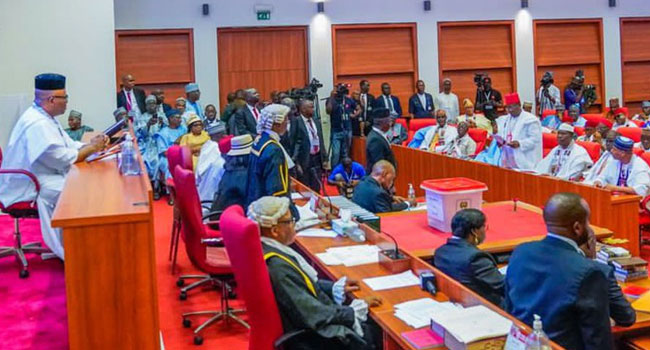Business
Video chat website Omegle, shuts down after 14 years

Popular social media network, Omegle, was shut down on Thursday after years of connecting strangers on the Internet.
Launched in 2009, the video chat site which enabled users to meet with new people from all across the world ceased operations 14 years after its inception.
The Chief Executive Officer, Leif K-Brooks, made the announcement on Thursday stating that the “battle” to keep the service afloat “has been lost.”
In the statement which featured the image of a gravestone with “Omegle” printed on it, K-Brooks emphasised that the service had several highlights throughout the years, most especially forging positive connections all across the world.
However, he also mentioned that some people used the site to “commit unspeakably heinous crimes”.
The statement read in part, “Over the years, people have used Omegle to explore foreign cultures; to get advice about their lives from impartial third parties; and to help alleviate feelings of loneliness and isolation. I’ve even heard stories of soulmates meeting on Omegle, and getting married. Those are only some of the highlights.
“Unfortunately, there are also lowlights. Virtually every tool can be used for good or for evil, and that is especially true of communication tools, due to their innate flexibility. The telephone can be used to wish your grandmother ‘happy birthday’, but it can also be used to call in a bomb threat. There can be no honest accounting of Omegle without acknowledging that some people misused it, including to commit unspeakably heinous crimes.
“Omegle’s moderation even had a positive impact beyond the site. Omegle worked with law enforcement agencies, and the National Center for Missing and Exploited Children, to help put evildoers in prison where they belong. There are ‘people’ rotting behind bars right now thanks in part to evidence that Omegle proactively collected against them, and tipped the authorities off to.”
Despite the efforts invested in ensuring the service keeps functioning, K-Brooks admitted that operating the service was no longer “sustainable, financially nor psychologically”.
“Unfortunately, what is right doesn’t always prevail. As much as I wish circumstances were different, the stress and expense of this fight – coupled with the existing stress and expense of operating Omegle, and fighting its misuse – are simply too much. Operating Omegle is no longer sustainable, financially nor psychologically. Frankly, I don’t want to have a heart attack in my 30s.
“The battle for Omegle has been lost, but the war against the Internet rages on. Virtually every online communication service has been subject to the same kinds of attack as Omegle; and while some of them are much larger companies with much greater resources, they all have their breaking point somewhere,” he wrote.
While Omegle has existed since 2009, the service experienced a surge in users during the Covid-19 pandemic. It has remained popular since then with several recording of users’ video chats going viral on other social media platforms.
However, with the increased popularity also came scrutiny from critics with many claiming that the service become a haven for sexual predators.
In July 2022, Omegle was dragged to court by a user who claimed that the company paired her a pedophile when she was 11 years old. The plaintiff claimed the predator went on to sexually exploit her, demanding for nude pictures and issuing threats against her for a period of three years.
The court ruled in favour of plaintiff, stating that Omegle cannot raise a defence based on Section 230 of the United States’ Communications Decency Act. The law was enacted to protect companies from being held responsible for third-party content created on their platforms.
Business
National Assembly proposes 50% tax relief to help companies increase salaries

The national assembly is considering a bill that will introduce a 50 percent tax relief for companies that increase salaries or offer transportation allowances to low-income workers.
The proposal is contained in an executive bill, titled ‘Nigeria Tax Bill 2024,’ dated October 4.
According to the bill, companies will be allowed an additional 50 percent deduction in their relevant years of assessment for costs incurred during the 2023 and 2024 calendar years.
The bill added that the qualifying expenses range from wage increases, transportation subsidies, or transport allowances granted to workers, whose gross monthly earnings are brought up to N100,000 or less.
However, the provision stipulates that any additional salary increase granted to employees earning above N100,000 monthly will not be eligible for the tax deduction.
“A company shall be entitled to an additional deduction of 50 per cent in the relevant years of assessment in respect of costs incurred in 2023 and 2024 calendar years on the following,” the document reads.
“(a) wage awards, salary increases, transportation allowance or transport subsidy granted to a low-income worker, which bring the gross monthly remuneration of the worker up to an amount not exceeding N100,000.00; provided that any additional award or salary increase to an employee earning above N100,000.00 as monthly salary shall not qualify for the additional deduction under this subsection;
“(b) salaries of any new employee constituting a net increase in the average number of new employees hired in 2023 and 2024 calendar years over and above the average net employment in the 3 preceding years, provided that such new employees are not involuntarily disengaged within a period of 3 years post-employment.”
On October 14, Taiwo Oyedele, chairman of the presidential committee on fiscal policy and tax reforms, said the personal income tax of Nigerians earning above N1.5 million will be increased under the new economic stabilisation bill.
Oyedele said people earning less than N1.5 million below would be exempted from the personal income tax (PIT).
On September 23, the federal executive council (FEC) approved the economic stabilisation bills seeking amendment of tax policies.
One of the bills offers tax relief to companies that generate incremental employment while another offers personal income relief to “people in private and public employment from N200,000 to N400,000”.
Business
“OceanGate Oil & Gas Engineering Company, a Nigerian Indigenous company Partners with Global Petroleum Group to Unveil the Largest Oil and Gas Project in Caribbean History – Grenada Set to Become a Major Energy Hub”

Oceangate Oil and Gas Engineering, under the leadership of Group CEO Dr. Aisha Sulaiman Achimugu, has secured a historic multi billion dollar deal with Global Petroleum Group to launch one of the Caribbean’s largest oil and gas ventures.
This transformative partnership aims to develop Grenada’s significant hydrocarbon reserves, paving the way for the island nation to emerge as a major energy hub in the Caribbean and beyond.

With a vision to fuel long-term economic growth and sustainable development, this ambitious project promises not only to elevate Grenada’s energy production capabilities but also to foster job creation, infrastructure development, and technology transfer within the local economy.
Set against the backdrop of the Caribbean’s evolving energy landscape, the venture is expected to provide unprecedented economic opportunities, delivering benefits across sectors and positioning Grenada as a key energy supplier in the region.

“We are thrilled to enter this partnership with Global Petroleum Group, which will bring substantial economic benefits and energy resources to Grenada,” said Dr. Achimugu.
“This venture underscores Oceangate’s commitment to investing in sustainable energy solutions that drive economic prosperity while respecting environmental standards.

We believe this project will lay the foundation for future economic collaborations between Africa and the Caribbean.
Business
Governor Umar Bago approves N80k minimum wage for Niger state civil servants

Umar Bago, governor of Niger, has approved N80,000 as the new minimum wage for civil servants in the state.
The governor approved the minimum wage for workers on Friday during a meeting with representatives of organised labour in Minna, the capital of Niger state.
In a statement released on his X, Bago announced that the state government had adopted N80,000 as the new minimum wage.
“In our own magnanimity as a state government, we have decided to adopt the minimum wage of N80,000 (Eighty Thousand Naira),” he said.
“In our own magnanimity as a state government, we have decided to adopt the minimum wage of N80,000 (Eighty Thousand Naira),” he said.
-

 News1 week ago
News1 week agoLagos state government urges Ogun Riverbank residents to prepare for relocation amid Oyan Dam water release
-

 Celebrities3 days ago
Celebrities3 days agoGod will continue to expose them, Angela Okorie tells Apostle Suleman after Halima’s apology
-

 World1 week ago
World1 week agoHamas leader Yahya Sinwar killed in Gaza military operation, says Israel
-

 World1 week ago
World1 week agoKenyan deputy president impeached while hospitalised
-

 News2 days ago
News2 days agoLagos state government announces traffic diversion for installation of truck barriers at Ojuelegba Bridge
-

 Sports1 week ago
Sports1 week agoBrazillian football star Vinicius suffers heartbreak as DNA test shows daughter isn’t his
-

 Business1 day ago
Business1 day ago“OceanGate Oil & Gas Engineering Company, a Nigerian Indigenous company Partners with Global Petroleum Group to Unveil the Largest Oil and Gas Project in Caribbean History – Grenada Set to Become a Major Energy Hub”
-

 Business1 week ago
Business1 week agoA Landmark Public-Private Partnership to Strengthen Security and Drive Growth in Enugu State
















